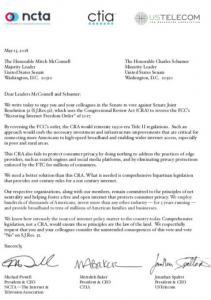Senate Pretends to Save the Internet
Boy, that was close. Without decisive action by the United States Senate, the Internet was headed for a death sentence on June 11th.
But thanks to careful analysis and a mature examination of the trade offs, this sad fate has been avoided. The FCC’s rash deregulatory action of last December has been nullified and once again, the Internet is open for cat videos, surveillance, organic food shopping, and video streaming.
The FCC, you see, was all set to repeal the all-important protections we’ve always (since June, 2015) relied on to prevent ISPs from turning the Internet into some kind of coin-operated vending machine where we would need to pay for our experiences instead of getting free stuff like we’re used to.
Granted, Facebook and Google can still sell our eyeballs to the highest bidder. And so can ISPs, unless Congress allows the FTC to regulate telecom carriers. But it’s magically all better because of the thing the Senate did today.
Nothing Changed
This is all fiction, of course.
The Senate simply passed a resolution of dubious legality expressing its wish to overturn the FCC’s Restoring Internet Freedom order. But that wish doesn’t become law without action by the House and a decision by the President not to veto the resolution.
All of that could happen, of course. But listening to the floor debate in the Senate today didn’t fill me with conviction that Congress really cares about this issue.
One after another, pro-repeal Senators repeated the same arguments we’ve heard for the past 15 years about horrible things that have never actually happened. I don’t mean to disrespect the Senate, but some of the speeches seemed more like entertainment than policy discourse. And none of them on the pro side addressed real consequences.
Congressional Review Act Resolutions are One-Time Deals
The Democrats made a huge mistake by using the Congressional Review Act instead of legislating. The Republicans had already used it to strike down the Obama FCC’s privacy regulations, and Democrats seem not to appreciate what that means for their efforts to repeal the RIF order.
Without RIF, the ISPs revert to Title II status. The law forbids the FTC from regulating Title II carriers, and the Republican CRA (the one that passed and became law) forbids the FCC from regulating ISP privacy practices in any serious way.
So the status quo that reigns in the event that this CRA passes will once again have the Internet surveillance industry – the ones with the most bothersome data collection practices – under FTC jurisdiction. It will also leave ISPs free to collect and sell pretty much everything they can find. The winners of today’s vote didn’t address this issue, but it’s the real one.
Incentives and Opportunities
Democrats are setting Internet users up for a privacy nightmare. Now that we’re into the 5G transition, ISPs need money to invest in infrastructure. This can’t come from fees to over-the-Internet services, even reasonable ones that players would gladly pay in order to avoid even higher fees to transit providers and CDNs. This is because the Obama regulations forbade third party fees.
So they will have to come from users and advertisers.
Users aren’t eager to pay higher fees to ISPs, and ISPs aren’t willing to ask for them. There’s just enough competition now between cable, telecom, satellite, and wireless that consumers feel empowered. T-Mobile, for example, is touting its ability offer high speed broadband video streaming over its 5G network. Even if it’s a dud, some will give it a shot.
With a less restrictive regulatory status for data collection than the dominant players currently have, significant access to behavioral data, and a need for infrastructure, it only reasonable to suppose that ISPs would explore every possible avenue for monetizing behavioral information.
The Press is Failing
The tech press – both mainstream media and the blogs – was too busy playing cheerleader today to comment on the implications of full passage of the Democrat CRA. Brian Fung actually misstated a letter to Senate leaders from the ISPs’ trade associations addressing the issue.
The letter points out that the CRA does nothing to address the troublesome practices of the surveillance industry (Google, Facebook, et al.) But Fung echoed the claim by Big Surveillance’s lobbyist, the Internet Association, that the practices in question are hate speech rather than tracking. Nope.
A CRA that returns ISPs to Title II status without addressing the privacy doughnut hole is problematic. That’s an issue that serious journalists should address once they’ve sobered up from today’s celebrations. We need uniform privacy regulations for ISPs and Big Surveillance. By doing the CRA, Democrats signaled a lack of willingness to address this problem at all.
Senate Democrats and their pals in Silicon Valley and in the media had a good day. But life goes on and the serious issues remain to be addressed. That’s why it’s not merely a talking point to say that bi-partisan legislation absolutely needs to be written for the orderly regulation of entire Internet’s data collection practices.
Even the Little Rascals had to grow up.




